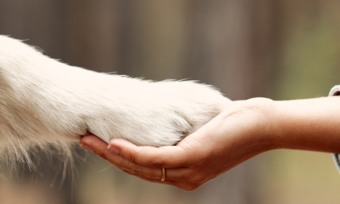Not sure what we mean by pet parenting mistakes? Maybe your cat has trained you for their chosen mealtime by complaining at the crack of dawn, or you let your pup jump on guests because they’re still small and manageable (but won’t be for long). Or perhaps you’re too loud and frequent with admonishments, rather than encouraging training gently but firmly.

1. Inconsistent pet training
It’s a story many of us know well. You’re trying to get your pup onto a healthy diet, while another family member is sneaking them treats. Or maybe you’re trying to train a command while someone else is sending mixed signals.
Remember that new pets don’t know the rules of your home – it’s up to you to teach them. Keep it consistent. Make sure all family members are on the same page and encourage the same behaviours in the same ways.
Family chat before you adopt your new dog? Honest convo when the new cat comes home? Best to do it sooner rather than later.
Pets thrive on routine
This needs to be emphasised – pets thrive on routine and consistency. When this doesn’t happen they can become confused and anxious. This could lead to a range of behavioural problems that you really, really want to avoid.
Truth be told a huge pet parenting mistake is when you’re inconsistent with your pet’s training, which goes hand-in-hand with establishing a routine. You’re giving off mixed signals. For example, if you let Fido jump up on the couch one day and then scold him for doing it the next, how will he get to learn your groove?
Inconsistent cat training can be really frustrating for both your feline and you. If your cat doesn’t know what you expect of them, they’ll act out in frustration.
Reinforce boundaries
Consistent pet training means setting clear boundaries. When your pet knows what’s expected of them, they’re more likely to behave appropriately.
This means setting consistent rules and sticking to them. For example, even if your cat looks at you with big round eyes and purrs at your ankles don’t give in to giving it more food. Stick by your routine, because it sets a precedent that will give your pet a sense of security in the long run.

2. Letting them be a loner
While some dog and cat breeds are naturally more outgoing, others need a bit more coaxing or prefer more along time. Ideally, your pet will develop the social skills they need to get along with other people and pets, which is why you need to socialise them early on.
Cats:
Socialising cats is straightforward. Invite guests over and have them gently, slowly get to know your cat. Keep in mind that some cats are naturally more aloof, while others like to cuddle. But if you don’t want your kitty quivering under the bed every time you have guests, then it’s vital to get them used to the sights and sounds of new people early on.
Dogs:
Dogs are socialised in a similar way, but it’s even more important to socialise your pup with other dogs. This can be done through puppy training classes, doggy daycare, park walks and introducing your pup to the pets of trusted friends and family.
3. Unhealthy eating habits
Some pets can be free-fed (the practice of always having pet food available) and will self-manage their eating. Others are highly food-motivated and will vacuum down any morsel of pet food put in front of them, even if they aren’t hungry.
The situation can become even more complicated if you have multiple pets with different eating habits.
It’s vital to tailor your feeding schedule and even feeding locations (for multi-pet households) to each pet. Overeating, resource guarding and pet food insecurity can cause health and mental problems. Nip this in the bud as quickly as possible!
4. Sharing medication
One mistake to be aware of is sharing medication. It’s true that some human medication can be given to pets, but doing so is fraught with danger! Only a vet can prescribe appropriate medication.
The same goes for giving medicine prescribed to one type of animal to another. Even if your pets are the same size and weight, some cat medicines are toxic for dogs, and vice versa. An accident with medication can cause serious illness or death, so it’s always better to check with your vet.
5. Too much tough love
Every pet parent knows the frustration of having a freshly planted flowerbed dug up, or a favourite pair of shoes decimated. While it can be understandable to be on the verge of losing your cool, remember your pets react strongly to your tone of voice and body language.
You may think you’re being firm but fair, however, a sensitive pet can become stressed if your parenting style doesn’t match their personality.
If you notice any of these responses, it’s time to take a step back and correct this pet parenting mistake by taking a gentler approach:
- Aggression
- Attempting to hide
- Hyperactivity
- Lack of appetite
- Loss of toilet training
- Lowered body language
- Shaking/trembling
- Showing whites of eyes
A great way to avoid tough love is by using reward-based pet training, also known as positive reinforcement training. When your cat or dog behaves appropriately, reward them with treats, praise or affection. This will help reinforce the behaviour you want to see and encourage your pet to continue behaving well.
Not only does this pet training method work well helping your pets learn, but it’s a great way to bond too.

6. Not enough play
Some breeds – particularly those with high intelligence or working dogs – need much more mental stimulation than a cat or faithful lapdog. That’s when pet toys and games come into the picture.
If your tried-and-tested games stop holding their interest, try new things, such as teaching commands, hiding treats, puzzles or hide-and-seek. Remember, a bored pet may resort to destroying your furniture, garden, or clothes as a source of entertainment, or to get your undivided attention.
7. Being unprepared for pet emergencies
When you bring a new pet home, the last thing on your mind is usually illness or accidents. It’s worth keeping in mind that vet treatments can be expensive. This is just another reason why more Kiwis are choosing pet insurance for cats and dogs.
No one wants to find themselves in the heartbreaking situation of deciding between their dollars or their pet. Avoid this pet parenting mistake by exploring your pet insurance options by clicking the button below.
Compare pet insurance providers here!
About the reviewer of this page
This report was reviewed by Canstar Content Producer, Caitlin Bingham. Caitlin is an experienced writer whose passion for creativity led her to study communication and journalism. She began her career freelancing as a content writer, before joining the Canstar team.
Enjoy reading this article?
You can like us on Facebook and get social, or sign up to receive more news like this straight to your inbox.
By subscribing you agree to the Canstar Privacy Policy






Share this article